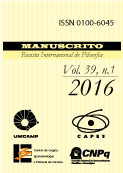Resumen
According to standard propositional logic, the inferences in which the conditional introduction rule is used are absolutely correct. However, people do not always accept inferences of that kind. Orenes and Johnson-Laird carried out interesting experiments in this way and, based on the general framework of the mental models theory, explained clearly in which cases and under which circumstances such inferences are accepted and rejected. The goals of this paper are both to better understand some aspects of Stoic logic and to check whether or not that very logic can also offer an account on this issue. My conclusions are that, indeed, this later logic can do that, and that the results obtained by Orenes and Johnson-Laird can be explained based on the information that the sources provide on Stoic logic.Citas
BARNES, J.; BOBZIEN, S. & MIGNUCCI, M. Logic. In K. Algra, J. Barnes, J.
Mansfeld, & M. Schofield (Eds.), The Cambridge History of Hellenistic Philosophy (pp. 77-225). Cambridge, UK: Cambridge University Press, 2008.
BOBZIEN, S. Stoic syllogistic. In C. C. W. Taylor (Ed.), Oxford Studies in Ancient Philosophy (pp. 133-192). Oxford, UK: Clarendon, 1996.
BOERI, M.D. & SALLES,R. Los filósofos estoicos: Ontología, lógica, física y ética. Santiago de Chile, Chile: Ediciones Universidad Alberto Hurtado, 2014.
GENTZEN, G. Untersuchungen über das logische Schließen I. Mathematische Zeitschrift, 39, 176-210, 1935.
GOULD, J. B. The Philosophy of Chrysippus. Albany, NY: State University of New York Press, 1970.
JOHNSON-LAIRD, P. N. The history of the mental models. In K. Manktelow & M. C. Chung (Eds.), Psychology and Reasoning: Theoretical and Historical Perspectives (pp. 179-212). New York, NY: Psychology Press, 2004.
JOHNSON-LAIRD, P. N. How We Reason. Oxford, UK: Oxford University Press, 2006.
JOHNSON-LAIRD, P. N. Against logical form. Psychologica Belgica, 5(3/4), 193-221, 2010.
JOHNSON-LAIRD, P. N. Inference with mental models. In K. J. Holyoak & R. G. Morrison (Eds.), The Oxford Handbook of Thinking and Reasoning (pp. 134-145). New York, NY: Oxford University Press, 2012.
JOHNSON-LAIRD, P. N. How to improve thinking. In R. Wegerif, L. Li, & J. C. Kaufman (Eds.), The Routledge International Handbook of Research on Teaching Thinking (pp. 80-91). Abingdon, UK, & New York, NY: Routledge, 2015.
KHEMLANI, S., ORENES, I., & JOHNSON-LAIRD, P. N. The negation of conjunctions, conditionals, and disjunctions. Acta Psychologica, 151, 1-7, 2014.
LÓPEZ-ASTORGA, M. Chrysippus’ indemonstrables and mental logic. Croatian Journal of Philosophy, 15(43), 1-15, 2015.
MUELLER, I. An introduction to Stoic logic. In J. M. Rist (Ed.), The Stoics (pp. 1-26). Berkeley, CA: University of California Press, 1978.
OAKHILL, J. & GARNHAM, A. (Eds.) Mental Models in Cognitive Science. Essays in Honour of Phil Johnson-Laird. Hove, UK: Psychology Press, 1996.
ORENES,I. & JOHNSON-LAIRD, P. N. Logic, models, and paradoxical inferences. Mind & Language, 27(4), 357-377, 2012.
O’TOOLE, R. R. & JENNINGS, R. E. The Megarians and the Stoics. In M. D. Gabbay & J. Woods (Eds.), Handbook of the History of Logic, Volume I. Greek, Indian and Arabic Logic (pp. 397-522). Amsterdam, The Netherlands: Elsevier, 2004.

